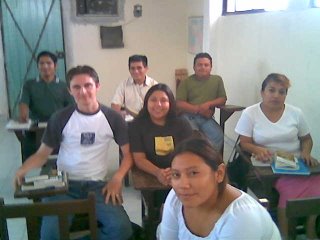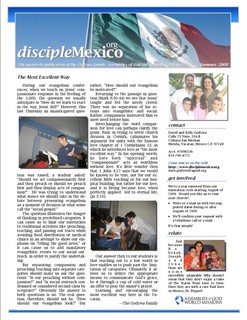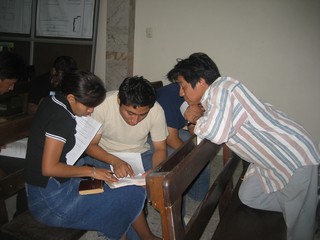I’ll be traveling to Florida next week in order to attend an ACLAME summit where teachers across Latin America will be meeting to discuss what we do as missionary educators. This upcoming convention has given me pause for thought about my own experience some of which I’d like to share with you today.
 As I’ve been here in Mérida, I’ve had the privilege of teaching for a year and a half in the Bible Institute. This is a job that I have met with much fear and feeling of responsibility. As James says, “Not many of you should presume toJ be teachers, my brothers, because you know that we who teach will be judged more strictly.” I understood the need to prepare myself mentally and spiritually for the task before me, something that my family could attest as they frequently find me in my “cave” praying and writing, trying to sort out what I am to share with my classes.
As I’ve been here in Mérida, I’ve had the privilege of teaching for a year and a half in the Bible Institute. This is a job that I have met with much fear and feeling of responsibility. As James says, “Not many of you should presume toJ be teachers, my brothers, because you know that we who teach will be judged more strictly.” I understood the need to prepare myself mentally and spiritually for the task before me, something that my family could attest as they frequently find me in my “cave” praying and writing, trying to sort out what I am to share with my classes.
Nevertheless, as I become more aware of the environment that I find myself in, I have found something that I was not prepared for. I entered into the learning environment with expectation. I was under the impression that the students that I would be teaching would be looking for answers, trying to hone their skills in order to seek the gospel take root in otherwise fruitless ground. I expected students to challenge me with their questions and compel me to further study as we sought to practically apply the theology that we assimilated each day, and in some cases, this is what I have found. But as I look over the half-finished assignments and the failing grades of others, I’ve faced a different reality, one that is in stark contrast with my expectations.
So I’m left with the task of answering the question, “what am I doing wrong?” Bruce Wilkinson, a teacher associated with Walk Thru The Bible Bible Ministries, says that motivating his or her students to learn is the task of the teacher. Therefore, if I am to be brutally honest with myself, and if I am to take James’ admonition at face value, then I need to reevaluate my teaching style and find out how I can reach those who fail to excel in their studies.
The Bible College system in Latin America accepts all students who feel called to the ministry regardless of their educational background. They need only letter of recommendation from their pastor in order to gain entrance into the program. This means that many of those who study lack the essential tools that they need in order to complete the requirements of the classes that they enter. I have found that the majority of students have never written a paper or done an investigation. One of my students admitted to me that her studies only reached as far as the fourth grade!
What does this mean? First, it seems to imply that education, according to my interpretation as the exchange and analysis of ideas is not necessarily the goal of my students. Instead, they are looking for intensely practical and readily applicable methods that they can use now in their context. They are not interested in asking questions; they are looking for answers. Therefore, my task as professor requires me to meet the expectations of my students by providing them answers while at the same time builds the tools that they need to make learning a lifestyle.
I find myself taking the role of a Mr Miyagi of the Karate Kid. Daniel, his student, wanted to learn to fight, but Mr Miyagi only left him to menial tasks like painting the fence and sanding the floor. Only when Daniel blocks a series of kicks and punches with techniques that he had learned by painting and sanding does he come to understand and appreciate Mr Miyagi’s style. So I’m restructuring my teaching style. Instead of driving ahead in order to complete the material, I am finding myself teaching concepts of research and reasoning, helping students formulate good questions for interviews, and locating good resources in the library. I’m breaking concepts down and trying to reinforce small steps toward large goals, all the while seeking to illustrate how the job of the minister makes the learning of each tool we cover essential.
On one hand, I lament not being able to get to “the meat” of the course, but at the same time, I realize that formal education, if it is honest with itself, must admit that it cannot impart all knowledge. I have only 3 years with a Bible School student. That is an incredibly short amount of time to communicate knowledge. Furthermore, I have to admit that I have forgotten far more that I have internalized over my 8 years of higher education. However, if I seek to impart the tools necessary to study, and convey an attitude that promotes learning, I can create a lifetime learner, an investigator who seeks to find the answer and apply truth in such a way as to create change. I guess that you could say that my goal is to create someone like the Karate Kid, who will find they have what it takes to survive and thrive in a world increasingly hostile to the traditional Christian message. I appreciate your prayers as I attempt to make this happen.
I have to go right now though. There is a fly buzzing and I need to find my chopsticks.










